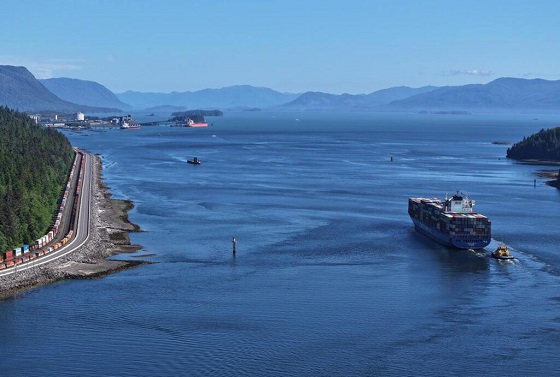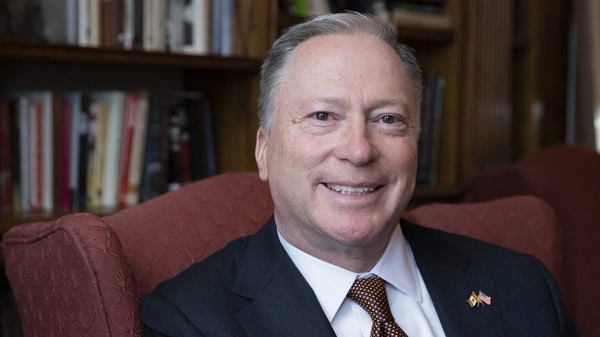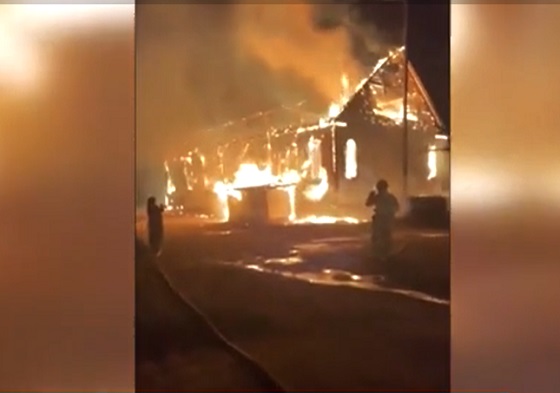Energy
Prince Rupert as the Optimal Destination Port for an Alberta Crude Oil Pipeline –

From Energy Now
Assessing the Strategic, Economic, and Environmental Advantages on British Columbia’s Northern Coast
With ongoing discussions about diversifying Alberta’s crude oil export routes, selecting the right destination port on British Columbia’s northern coast is critical. This analysis examines Prince Rupert as a prime candidate, highlighting why it stands out as the best choice for a new Alberta crude oil pipeline.
Geographic and Logistical Advantages
Prince Rupert is Canada’s deepest natural harbour and is located approximately 1,500 kilometres closer to Asian markets than Vancouver. Its northern coastal position provides a shorter and more direct shipping route across the Pacific, reducing transit times and shipping costs. The port’s location also means ships can avoid the congested and environmentally sensitive waters of southern British Columbia, including the Salish Sea and Vancouver’s busy port.
Infrastructure and Expansion Capacity
Prince Rupert has a modern and rapidly expanding port infrastructure. The Port of Prince Rupert already handles bulk cargo, containers, and other exports, and it has significant capacity for further development. There is available land and established transportation corridors—including rail lines operated by CN Rail—that connect directly to Alberta, making it logistically feasible to construct a new pipeline and efficiently move crude oil to tidewater.
Economic Benefits
A pipeline terminating at Prince Rupert would open up Alberta’s crude oil to global markets, particularly in Asia, increasing market access and potentially securing better prices for Canadian oil producers. The economic spin-offs for both Alberta and northern British Columbia include job creation, increased tax revenue, and local business opportunities in construction, operations, and port services.
Environmental and Community Considerations
Shipping crude oil from Prince Rupert avoids some of the most ecologically sensitive regions along the southern coast. The port’s deep waters allow for safer navigation of large tankers, reducing the risk of groundings and spills. Additionally, the relatively low population density around Prince Rupert compared to southern ports minimizes the social impact and opposition that has historically challenged energy projects in more urbanized regions.
Strategic and Security Factors
The northern location of Prince Rupert is advantageous from a national security perspective. It is less vulnerable to geopolitical tensions and traffic bottlenecks that can affect southern ports. The port’s proximity to the open Pacific also reduces the time tankers spend in Canadian waters, limiting exposure to potential environmental incidents.
Prince Rupert’s strategic location, robust infrastructure, economic potential, and lower environmental and social risks make it the best choice for a new Alberta crude oil pipeline on British Columbia’s northern coast. Its selection would not only enhance Canada’s energy export capabilities but also support responsible economic development in Western Canada.
Business
Major Projects Office Another Case Of Liberal Political Theatre

From the Frontier Centre for Public Policy
By Lee Harding
Ottawa’s Major Projects Office is a fix for a mess the Liberals created—where approval now hinges on politics, not merit.
They are repeating their same old tricks, dressing up political favouritism as progress instead of cutting barriers for everyone
On Sept. 11, the Prime Minister’s Office announced five projects being examined by its Major Projects Office, all with the potential to be fast-tracked for approval and to get financial help. However, no one should get too excited. This is only a bad effort at fixing what government wrecked.
During the Trudeau years, and since, the Liberals have created a regulatory environment so daunting that companies need a trump card to get anything done. That’s why the Major Projects Office (MPO) exists.
“The MPO will work to fast-track nation-building projects by streamlining regulatory assessment and approvals and helping to structure financing, in close partnership with provinces, territories, Indigenous Peoples and private investors,” explains a government press release.
Canadians must not be fooled. A better solution would be to create a regulatory and tax environment where these projects can meet market demand through private investment. We don’t have that in Canada, which is why money has fled the country and our GDP growth per capita is near zero.
Instead of this less politicized and more even-handed approach, the Liberals have found a way to make their cabinet the only gatekeepers able to usher someone past the impossible process they created. Then, having done so, they can brag about what “they” got done.
The Fraser Institute has called out this system for its potential to incentivize bribes and kickbacks. The Liberals have such a track record of handing out projects and even judicial positions to their friends that such scenarios become easier to believe. Innumerable business groups will be kissing up to the Liberals just to get anything major done.
The government has created the need for more of itself, and it is following up in every way it can. Already, the federal government has set up offices across Canada for people to apply for such projects. Really? Anyone with enough dollars to pursue a major project can fly to Ottawa to make their pitch.
No, this is as much about the show as it is about results—and probably much more. It is all too reminiscent of another big-sounding, mostly ineffective program the Liberal government rolled out in 2017. They announced a $950-million Innovation Superclusters Initiative “designed to help strengthen Canada’s most promising clusters … while positioning Canadian firms for global leadership.”
That program allowed any company in the world to participate, with winners getting matching dollars from taxpayers for their proposals. (But all for the good of Canada, we were told.) More than 50 applications were made for these sweepstakes, which included more than 1,000 businesses and 350 other participants. In Trudeau Liberal fashion, every applicant had to articulate how their proposal would increase female jobs and leadership and encourage diversity in the long term.
The entire process was like one big Dragon’s Den series. The Liberals trotted out a list of contestants full of nice-sounding possibilities, with maximum hype and minimal reality. Late in the process, Minister of Innovation, Science and Industry Navdeep Bains picked the nine finalists himself (all based in cities with a Liberal MP), from which five would be chosen.
The alleged premise was to leverage local and regional commercial clusters, but that soon proved ridiculous. The “Clean, Low-energy, Effective and Remediated Supercluster” purported to power clean growth in mining in Ontario, Quebec and Vancouver. Not to be outdone, the “Mobility Systems and Technologies for the 21st Century Supercluster” included all three of these locations, plus Atlantic Canada. They were only clustered by their tendency to vote Liberal.
Today, the MPO repeats this virtue-signalling, politicking, drawn-out, tax-dollar-spending drama. The Red Chris Mine expansion in northwest British Columbia is one of the proposals under consideration. It would be done in conjunction with the Indigenous Tahltan Nation and is supposed to reduce greenhouse gas emissions by 70 per cent. That’s right up the Liberal alley.
Meanwhile, the project is somehow part of a proposed Northwest Critical Conservation Corridor that would cordon off an area the size of Greece from development. Is this economic growth or economic prohibition? This approach is more like the United Nations’ Agenda 2030 than it is nation-building. And it is more like the World Economic Forum’s “stakeholder capitalism” approach than it is free enterprise.
At least there are two gems among the five proposals. One is to expand capacity at the Port of Montreal, and another is to expand the Canada LNG facility in Kitimat, B.C. Both have a market case and clear economic benefits.
Even here, Canadians must ask themselves, why must the government use a bulldozer to get past the red tape it created? Why not cut the tape for everyone? The Liberals deserve little credit for knocking down a door they barred themselves.
Lee Harding is a research fellow for the Frontier Centre for Public Policy.
Alberta
Enbridge CEO says ‘there’s a good reason’ for Alberta to champion new oil pipeline

Enbridge CEO Greg Ebel. The company’s extensive pipeline network transports about 30 per cent of the oil produced in North America and nearly 20 per cent of the natural gas consumed in the United States. Photo courtesy Enbridge
From the Canadian Energy Centre
B.C. tanker ban an example of federal rules that have to change
The CEO of North America’s largest pipeline operator says Alberta’s move to champion a new oil pipeline to B.C.’s north coast makes sense.
“There’s a good reason the Alberta government has become proponent of a pipeline to the north coast of B.C.,” Enbridge CEO Greg Ebel told the Empire Club of Canada in Toronto the day after Alberta’s announcement.
“The previous [federal] government’s tanker ban effectively makes that export pipeline illegal. No company would build a pipeline to nowhere.”
It’s a big lost opportunity. With short shipping times to Asia, where oil demand is growing, ports on B.C.’s north coast offer a strong business case for Canadian exports. But only if tankers are allowed.
A new pipeline could generate economic benefits across Canada and, under Alberta’s plan, drive economic reconciliation with Indigenous communities.
Ebel said the tanker ban is an example of how policies have to change to allow Canada to maximize its economic potential.
Repealing the legislation is at the top of the list of needed changes Ebel and 94 other energy CEOs sent in a letter to Prime Minister Mark Carney in mid-September.
The federal government’s commitment to the tanker ban under former Prime Minister Justin Trudeau was a key factor in the cancellation of Enbridge’s Northern Gateway pipeline.
That project was originally targeted to go into service around 2016, with capacity to ship 525,000 barrels per day of Canadian oil to Asia.
“We have tried to build nation-building pipelines, and we have the scars to prove it. Five hundred million scars, to be quite honest,” Ebel said, referencing investment the company and its shareholders made advancing the project.
“Those are pensioners and retail investors and employees that took on that risk, and it was difficult,” he said.
For an industry proponent to step up to lead a new Canadian oil export pipeline, it would likely require “overwhelming government support and regulatory overhaul,” BMO Capital Markets said earlier this year.
Energy companies want to build in Canada, Ebel said.
“The energy sector is ready to invest, ready to partner, partner with Indigenous nations and deliver for the country,” he said.
“None of us is calling for weaker environmental oversight. Instead, we are urging government to adopt smarter, clearer, faster processes so that we can attract investment, take risks and build for tomorrow.”
This is the time for Canadians “to remind ourselves we should be the best at this,” Ebel said.
“We should lead the way and show the world how it’s done: wisely, responsibly, efficiently and effectively.”
With input from a technical advisory group that includes pipeline leaders and Indigenous relations experts, Alberta will undertake pre-feasibility work to identify the pipeline’s potential route and size, estimate costs, and begin early Indigenous engagement and partnership efforts.
The province aims to submit an application to the Federal Major Projects Office by spring 2026.
-

 National1 day ago
National1 day agoDemocracy Watch Renews Push for Independent Prosecutor in SNC-Lavalin Case
-

 Alberta1 day ago
Alberta1 day agoClick here to help choose Alberta’s new licence plate design
-

 International1 day ago
International1 day agoHamas will disarm or die
-

 International1 day ago
International1 day agoDaughter convinces healthy father to die in double assisted suicide with mother
-

 illegal immigration1 day ago
illegal immigration1 day agoLos Angeles declares a state of emergency over ICE deportations
-

 International1 day ago
International1 day agoUS Warns Hamas To Halt Executions
-

 Business1 day ago
Business1 day ago‘Taxation Without Representation’: Trump Admin Battles UN Over Global Carbon Tax
-

 Indigenous24 hours ago
Indigenous24 hours agoConstitutional lawyer calls for ‘false’ claims to end in Canadian residential schools burials





